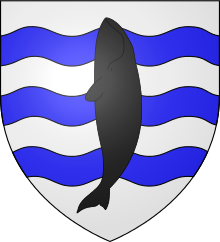Admiral Jellicoe
|
Admiral of the Fleet The Right Honourable The Earl Jellicoe GCB, OM, GCVO, SGM, DL |
|
|---|---|
 |
|
| 2nd Governor-General of New Zealand | |
|
In office 27 September 1920 – 12 December 1924 |
|
| Monarch | George V |
| Preceded by | The Earl of Liverpool |
| Succeeded by | Sir Charles Fergusson |
| Personal details | |
| Born | 5 December 1859 Southampton, Hampshire, England |
| Died | 20 November 1935 (aged 75) Kensington, London, England |
| Military service | |
| Allegiance | United Kingdom |
| Service/branch | Royal Navy |
| Years of service | 1872–1919 |
| Rank | Admiral of the Fleet |
| Commands |
First Sea Lord Grand Fleet Atlantic Fleet HMS Drake HMS Centurion |
| Battles/wars | |
| Awards |
Knight Grand Cross of the Order of the Bath Member of the Order of Merit Knight Grand Cross of the Royal Victorian Order Sea Gallantry Medal |
| John Jellicoe, 1st Earl Jellicoe | |
|---|---|
 |
|
| Details | |
| Crest | Out of a naval crown or a demi-wolf azure. |
| Supporters | On either side a sea griffin or. |
| Motto | Sui memores alios fecere merendo: "Remembered for their merits." |
Anglo-Egyptian War
Boxer Rebellion
First World War
Admiral of the Fleet John Rushworth Jellicoe, 1st Earl Jellicoe, GCB, OM, GCVO, SGM, DL (5 December 1859 – 20 November 1935) was a Royal Navy officer. He fought in the Anglo-Egyptian War and the Boxer Rebellion and commanded the Grand Fleet at the Battle of Jutland in May 1916 during the First World War. His handling of the fleet at that battle was controversial. Jellicoe made no serious mistakes and the German High Seas Fleet retreated to port, at a time when defeat would have been catastrophic for Britain. But the British public was disappointed that the Royal Navy had not won a victory on the scale of the Battle of Trafalgar. Jellicoe later served as First Sea Lord, overseeing the expansion of the Naval Staff at the Admiralty and the introduction of convoys, but was relieved at the end of 1917. He also served as the Governor-General of New Zealand in the early 1920s.
Born the son of John Henry Jellicoe, a captain in the Royal Mail Steam Packet Company, and Lucy Henrietta Jellicoe (née Keele) and educated at Field House School in Rottingdean, Jellicoe joined the Royal Navy as a midshipman in the training ship HMS Britannia in 1872. He was made a midshipman in the steam frigate HMS Newcastle in September 1874 before transferring to the ironclad HMS Agincourt in the Mediterranean Fleet in July 1877. Promoted to sub-lieutenant on 5 December 1878, he joined HMS Alexandra, flagship of the Mediterranean Fleet, as signal sub-lieutenant in 1880. Promoted to lieutenant on 23 September 1880, he returned to HMS Agincourt in February 1881 and commanded a rifle company of the Naval Brigade at Ismailia during the Egyptian war of 1882.
...
Wikipedia
